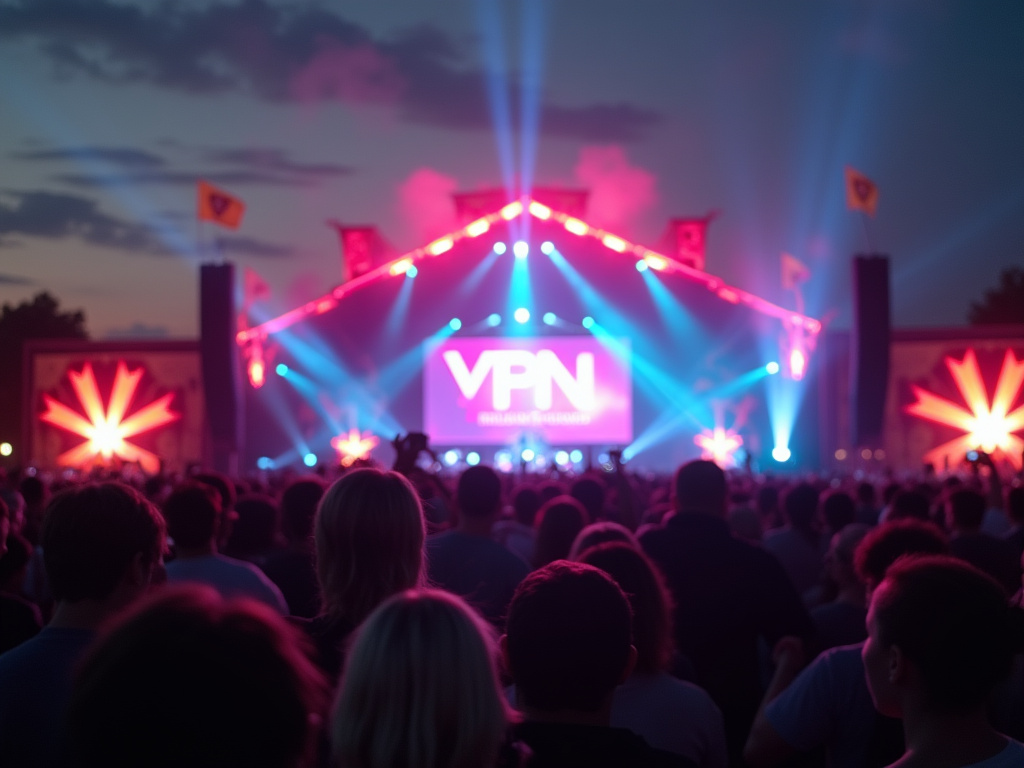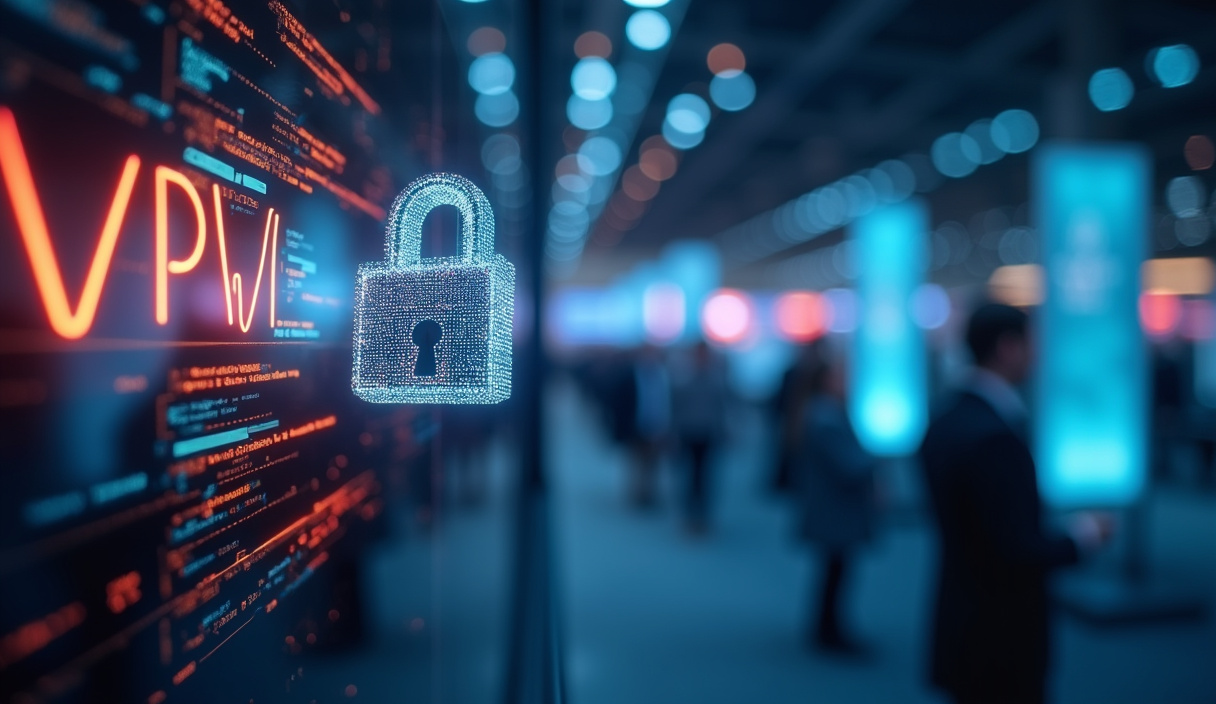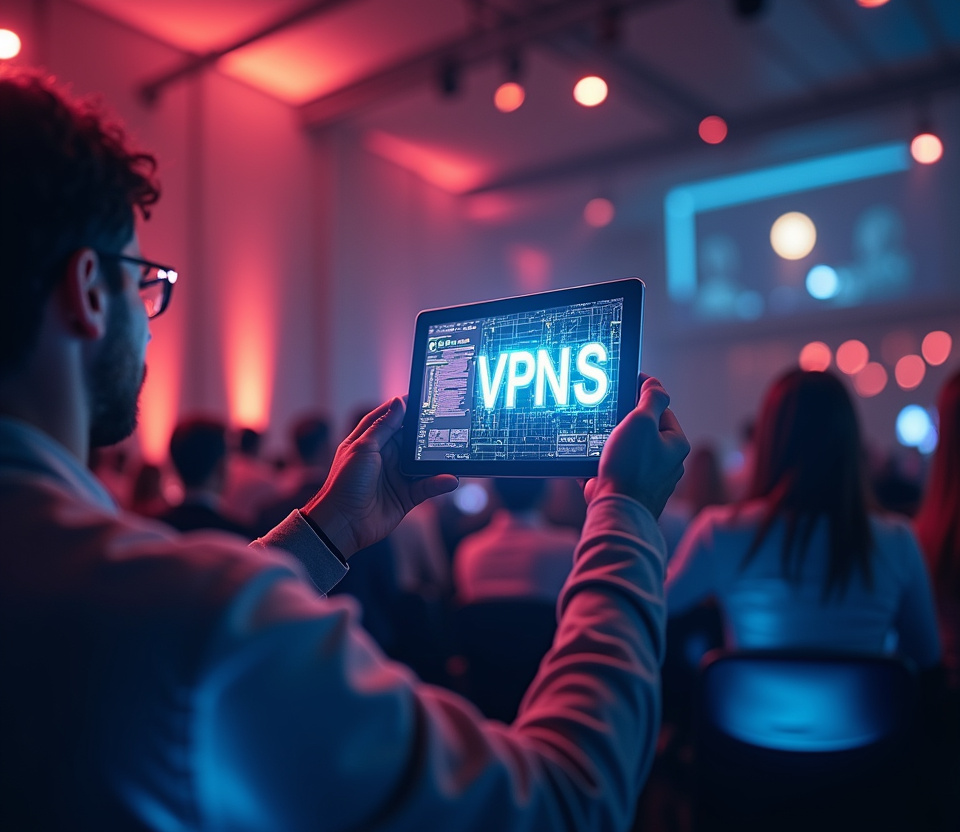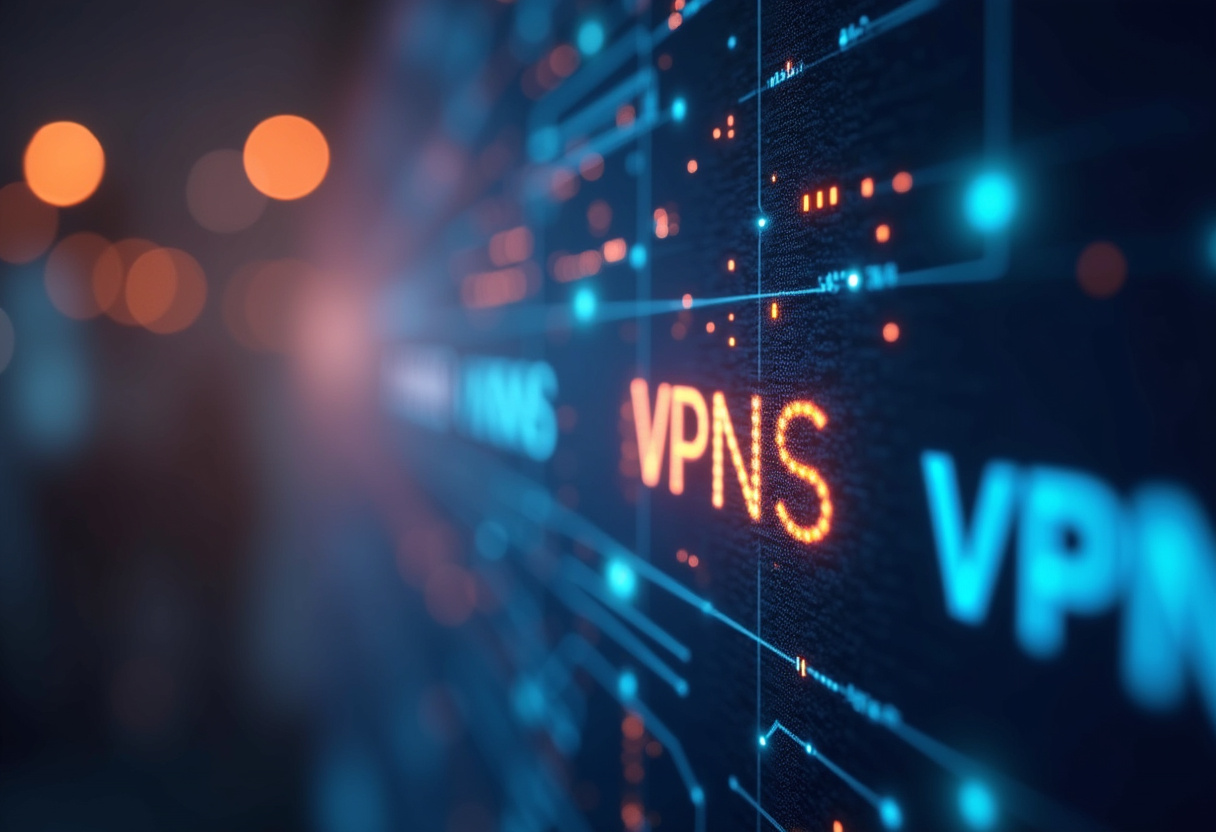VPNs for Music Festivals: Safeguarding Attendee Information

Table of Contents
VPNs for Music Festivals: Safeguarding Attendee Information
Music festivals, vibrant celebrations of music, art, and community, have become increasingly reliant on technology for everything from ticketing and cashless payments to real-time communication and enhanced on-site experiences. This digital transformation, while offering numerous benefits, also introduces significant cybersecurity vulnerabilities. The sheer volume of sensitive attendee information collected and processed by festivals makes them prime targets for cyberattacks.
Protecting this data isn't just about avoiding negative publicity; it's about upholding ethical obligations, complying with stringent data protection laws, and ensuring the financial and reputational integrity of the event. A crucial tool in this endeavor is the Music Festival VPN, providing a robust and effective means of securing attendee information and enhancing overall festival operations. A VPN provides a secure, encrypted tunnel for all data transmitted within and outside the festival network, ensuring comprehensive data protection and enhanced privacy for festival attendees and organizers.
At its core, a VPN functions by creating an encrypted connection between a user's device (whether it's a ticketing kiosk, a vendor's point-of-sale system, or an attendee's smartphone) and a remote server. All data transmitted between the device and the server is scrambled, rendering it unreadable to unauthorized parties. This encryption is particularly vital in environments with public Wi-Fi networks, which are notoriously insecure.
In such networks, data transmitted without encryption can be easily intercepted by hackers lurking on the same network. Attendees entering their credit card details, logging into accounts, or sharing personal information on public Wi-Fi run the risk of having their data stolen if the network lacks adequate security measures. By using a VPN, attendees are able to establish a private encrypted connection even when using potentially compromised Wi-Fi networks.
Beyond protecting attendees, a VPN secures the festival's internal communications and data transfers. Music festivals often involve a large number of temporary staff, vendors, and volunteers, many of whom require access to sensitive data, such as ticketing information, vendor contracts, and attendee medical details. This decentralized environment increases the risk of data breaches, as any compromised device or unsecured connection could serve as an entry point for attackers.
A professional grade music festival VPN encrypts all data transmitted between these various entities, drastically reducing the risk of unauthorized access. This is particularly useful to the event organizers as there are many 3rd parties involved in the different areas of the event, and with a VPN, they can limit the data breaches from them. Furthermore, the Music Festival VPN plays a critical role in securing ticket sales, a crucial revenue stream for festivals.
Online ticketing platforms are frequent targets for malicious actors seeking to steal attendee payment information or create counterfeit tickets. A VPN can create a secure portal for ticket transactions, ensuring that sensitive payment data is encrypted and protected from interception. By obscuring the actual IP addresses of festival servers, a VPN makes it more difficult for hackers to launch targeted attacks against the ticketing system.
Hackers deploy automated bots to overwhelm the ticketing servers with malicious requests. The VPN setup will help to mitigate all sorts of DDoS attacks, and protect the event finances. In addition to these core security benefits, a VPN enables festival organizers to manage and segment network access more effectively.
A music festival creates segmented internal networks, restricting access to sensitive data to only authorized personnel. For instance, ticketing data can be restricted to the ticketing team, while vendor information can be limited to the operations team. Such data segmentation minimizes the risk of potential for data breaches, and ensure that sensitive information is only accessible to those the organizers see fit.
As data privacy regulations become increasingly stringent, using a music festival VPN to secure attendee information demonstrates a commitment to compliance. By encrypting data and providing other security measures, a VPN helps to meet the requirements of these laws, reducing. In a nutshell, the music festival VPN provides a secure, encrypted tunnel for all data transmitted within and outside the festival network, and secures the communication of all the parties involved into the festival operations while segmenting critical data for better managing.
Encrypted Connections: How VPNs Protect Attendee Data on Public Wi-Fi
Implementing a Music Festival VPN involves more than simply selecting a provider and installing an application. It requires a strategic approach that addresses the unique challenges and requirements of a large-scale event. Careful planning, diligent execution, and ongoing monitoring and maintenance are essential to ensure the VPN effectively protects attendee information and enhances overall festival security.
The foremost consideration is selecting a VPN solution that offers robust security features, scalability, and ease of management. Encryption protocols such as AES-256 are paramount, ensuring that all data transmitted through the VPN is effectively scrambled and protected from unauthorized access. The VPN solution must also support a sufficient number of simultaneous connections to accommodate all festival staff, vendors, and potentially even attendees if the festival chooses to offer secure Wi-Fi access.
Scalability is important, particularly for large festivals that may experience fluctuating network traffic and user participation. Moreover, the VPN must be easy to setup and configure, so no network down time. Ease of use is also a critical factor, particularly in a fast-paced festival environment where technical support resources may be limited.
The VPN solution should offer intuitive management interfaces and user-friendly applications across a range of devices, allowing seamless connectivity for users with varying levels of technical expertise. Staff and vendors will need to quickly and easily connect to the VPN throughout the festival grounds, so a simple and reliable interface is essential. Setting up the VPN involves creating a virtual network that encompasses all critical areas of the festival, including ticketing booths, vendor stations, security checkpoints, administrative offices, and potentially even on-site camping areas.
The VPN can be configured on dedicated routers and security appliances, as well as on individual devices, ensuring that all data transmitted within the network is encrypted and protected. Careful planning is required to ensure that the VPN network integrates seamlessly with existing festival infrastructure, without disrupting existing operations. One of the biggest things is to train festival staff and vendors on the importance of connecting through the VPN and protecting the organization's assets, especially in the current threat landscape.
Staff must understand how to connect to the VPN, how to verify that the VPN is active, and how to identify and report potential security incidents. Vendors should be trained on best practices for securing their devices and protecting sensitive data, such as payment information and attendee contact details. Regular security audits and penetration testing should be conducted to identify and address potential vulnerabilities in the VPN setup.
Security audits involve a thorough review of the VPN's configuration, policies, and procedures to ensure that they align with industry best practices and regulatory requirements. Penetration testing involves simulating real-world cyberattacks to identify weaknesses in the VPN's security defenses. These assessments can help the festival to discover any misconfigurations or vulnerabilities that could be exploited by malicious actors.
Continuous monitoring of network traffic and security logs is also essential for detecting and responding to security threats. The VPN should be configured to generate detailed logs of all network activity, including connection attempts, data transfers, and potential security incidents. Security personnel should regularly review these logs to identify suspicious patterns or anomalies that could indicate a security breach.
Automated security information and event management (SIEM) solutions can be used to aggregate and analyze security logs from multiple sources, providing a comprehensive view of the festival's security posture. In the event of a security incident, the festival should have a well-defined response plan in place to quickly contain the damage and restore normal operations. The incident response plan should outline clear roles and responsibilities, communication protocols, and procedures for isolating affected systems, preserving evidence, and notifying relevant stakeholders.
Regularly testing the incident response plan through simulated exercises can help to ensure that the festival is prepared to respond effectively to real-world security incidents. Effectively, a music festival VPN involves a blend of technology, policies, and security procedures that should be consistently and regularly tested for improvements, and the most sensitive network zones should be segmented as well as training all involved actors in the operations.
Securing Internal Communications: Protecting Sensitive Data Among Staff and Vendors
Ticket Sales Protection is a cornerstone of any successful music festival, and in an era of increasingly sophisticated cyber threats, ensuring the security of this critical operation is paramount. Music festivals rely heavily on online ticket sales, making them a prime target for hackers seeking to steal attendee payment information, create fraudulent tickets, or disrupt the entire sales process. A Music Festival VPN plays a vital role in enhancing ticket sales protection by creating a secure environment for online transactions and mitigating a range of cyber threats.
The core element of this protection lies in establishing a secure channel for online transactions. When attendees purchase tickets through a VPN-secured portal, all payment information, including credit card numbers, expiration dates, and CVV codes, is encrypted from the moment it leaves the attendee's device until it reaches the payment processor. Encryption scrambles readable data into an unreadable format, making its inaccessible to hackers.
This encryption prevents malicious actors from intercepting payment data as it travels across the internet. Strong encryption protocols, such as Advanced Encryption Standard (AES), paired with Secure Sockets Layer (SSL) or Transport Layer Security (TLS) certificates, are used to establish secure, encrypted connections between the attendee's device and the ticketing server. A second critical function of music festival VPNs is preventing DDoS attacks, which can severely disrupt ticket sales and prevent legitimate customers from purchasing tickets.
DDoS attacks flood a server with malicious traffic, overwhelming it and making it unresponsive to legitimate user requests. This effectively shuts down the ticketing system, costing the festival revenue and frustrating potential attendees. A VPN helps to defend against DDoS attacks by obscuring the origin of the traffic.
By routing all traffic through the VPN server, the actual IP addresses of the festival servers are hidden from external attackers. This makes it more difficult for attackers to target specific servers with malicious traffic. Additionally, VPNs often employ traffic filtering and rate limiting techniques to identify and block malicious requests before they reach the ticketing system.
For example, if a large volume of traffic originates from a single IP address, the VPN can automatically block that traffic, preventing it from overwhelming the server. Moreover, VPNs play a key role in preventing fraudulent ticket sales. Scammers often use bots and automated scripts to purchase large quantities of tickets, which they then resell at inflated prices on secondary markets.
This deprives genuine fans of the opportunity to purchase tickets at face value and damages the reputation of the festival. A VPN can help to mitigate these issues by blocking bot traffic and preventing scammers from purchasing tickets in bulk. VPN-based security measures can identify and filter out bot traffic, as well as implement CAPTCHA challenges to verify that users are human.
Furthermore, VPNs can be used in conjunction with fraud detection systems to flag suspicious transactions. Transactions that originate from unusual locations, involve multiple purchases with the same credit card, or exhibit other patterns indicative of fraud can be flagged for further investigation. The ticketing system can then automatically cancel these fraudulent transactions, preventing scammers from acquiring tickets.
Additionally, using a VPN can also help to protect against brute force attacks on user accounts. In a brute force attack, hackers attempt to guess user passwords by trying multiple combinations of characters until they gain access to the account. A VPN can limit the rate of login attempts from a single IP address, making it more difficult for hackers to crack user passwords.
Furthermore, multi-factor authentication can be implemented to enhance the security of user accounts, requiring users to provide a second form of verification. Effective ticket sales protection using a VPN requires a multi-layered approach that combines technical controls with operational procedures and staff training. For example, traffic to the ticketing services must be constantly monitored to identify possible threats and irregular behavior.
Any unusual patterns should be promptly investigated and resolved. Additionally, all technological strategies must align with defined protocol and standard operating procedures in case of any major threats arise. In conclusion, a Music Festival VPN improves ticket sales by providing a secure tunnel for online payments and mitigating a range of threats.
DDoS and brute force attacks are some of the threats that prevent the customer from purchasing tickets. VPNs play a key role in preventing fraud with strong authentication factors to purchase the tickets and helping genuine fans participate in the event. By using a good VPN, festivals can create a secure environment and increase integrity for ticket operations.
Protecting Ticket Sales: Preventing Fraud and Ensuring Secure Transactions
Privacy, a fundamental right often overlooked in the digital age, takes on heightened importance in the context of large-scale events like music festivals. Attendees entrust festivals with a wealth of personal information, from basic contact details to sensitive financial data and potentially even medical information. How this data is collected, stored, used, and protected directly impacts attendee trust and the festival's reputation.
A Music Festival VPN significantly bolsters attendee privacy by minimizing data collection, anonymizing online activity, and empowering individuals with greater control over their personal information. One of the most significant ways a VPN enhances privacy is by minimizing the amount of data that is collected and stored. Traditional data collection practices often involve tracking user activity across websites, apps, and even physical locations within the festival grounds.
This data can then be used for targeted advertising, personalized marketing, or even sold to third parties. Using a VPN encrypts user traffic and obscures their IP address, making it more difficult to track their online activity. The VPN ensures that the data collected is anonymized, preventing third parties from linking online activity back to a specific individual.
Beyond simply minimizing data collection, a Music Festival VPN empowers attendees with greater control over their personal information. While festivals often require attendees to provide certain information for ticketing and security purposes, attendees should have the right to control how that information is used and shared. A VPN can help to facilitate this control by giving attendees the ability to opt-out of data tracking, limit the use of their personal information, and request the deletion of their data.
For instance, attendees can use the VPN to block tracking cookies and prevent websites from collecting data about their browsing habits. Attendees will have the ability to install privacy-enhancing browser extensions that block tracking scripts and advertisements. By educating attendees about the importance of data privacy and providing them with tools to protect their information, festivals can build trust and foster a more privacy-conscious culture.
An environment where data privacy is practiced will empower attendees to have control over their private information. Transparency about data practices is equally critical. Festivals must be upfront about what data they collect, how they use it, and with whom they share it.
Privacy policies should be written in clear, understandable language, avoiding legal jargon that may confuse attendees. Attendees should also be given the option to access their data, correct any inaccuracies, and request its deletion. By implementing transparent data practices, festivals can demonstrate their commitment to protecting attendee privacy and building trust.
VPNs empower attendees to connect and protect their personal data with confidence even while engaging in other activities, and minimize data collection from festival ticketing services and third party vendors. Another very important key function is to ensure secure communications. Attendees often use their mobile devices to communicate with friends, share photos and updates on social media, and access information about the festival lineup and schedule.
An organization that cares about their attendees will protect these communications from being intercepted by malicious actors and enable encrypting message communications, as well as file transfers. By encrypting all internet traffic on the mobile device, a Music Festival VPN ensures that these communications remain private and confidential. This is particularly important when attendees are using public Wi-Fi networks, which are often unsecured.
A VPN offers transparency about all data communication protocols, and gives festival organizers full control of what type of data must be collected, as well as protecting their attendees, and giving them control over their data. In essence, a Music Festival VPN is more than just a security tool; it is a key element in fostering a culture of privacy and empowering attendees to take control of their digital footprint. The attendee will feel secure and trusted to share any type of data, but only in a secure environment.
Transparency offers tools for attendees to enhance data security, reduce communications from third party actors, and ensures all policies are in place to secure their data. The music event can focus and ensure the attendee will enjoy this enhanced security for a unique data secured experience.
VPNs for events, especially music festivals, extend beyond the immediate benefits of security and privacy, offering a range of operational enhancements that contribute to a smoother, more efficient, and ultimately more successful festival experience. These enhancements span network management, access control, and even improved data analytics, demonstrating that a VPN is not just a security measure but a strategic asset. One of the primary operational advantages of a Music Festival VPN is enhanced network management capabilities, enabling festivals to optimize network performance, prioritize critical traffic, and troubleshoot network issues more effectively.
A VPN provides a centralized point of control for managing network access, allowing festival organizers to segment the network into different zones, each with its own set of security policies and access controls. For instance, ticketing booths can be placed on a separate network segment from vendor stations, limiting the potential for a security breach in one area to compromise the entire network. Furthermore, network traffic can be prioritized based on its importance, ensuring that critical services, such as point-of-sale systems and emergency communications, receive the bandwidth they need to function reliably.
A VPN also provides valuable insights into network traffic patterns, helping festival organizers to identify and address potential bottlenecks or performance issues. By monitoring network traffic in real-time, organizers can proactively address problems before they impact the attendee experience. For example, if they notice that a particular area of the festival is experiencing high network congestion, they can reallocate bandwidth or deploy additional access points to alleviate the problem.
In addition to network management benefits, a VPN also facilitates more granular access control, enabling festival organizers to restrict access to sensitive data and systems to only authorized personnel. This is particularly important in an environment where numerous temporary staff and vendors require access to the festival network. A VPN can be configured to require strong authentication for all users, such as multi-factor authentication, ensuring that only authorized individuals can access sensitive resources.
Access rights can be assigned based on roles and responsibilities, ensuring that each user only has access to the data and systems they need to perform their duties. VPN-based access control can also be used to enforce compliance with security policies. For example, the VPN can be configured to automatically disconnect devices that are not in compliance with security standards, such as those running outdated software or lacking antivirus protection.
Using VPNs for access control safeguards data, and ensures the organization is following industry-grade certifications and security policies. While primarily known for security and privacy, a Music Festival VPN can also enhance data analytics capabilities. By aggregating and anonymizing network traffic data, festivals can gain valuable insights into attendee behavior, preferences, and demographics.
This data can then be used to optimize festival operations, improve marketing efforts, and enhance the overall attendee experience. For example, by tracking which areas of the festival are most popular, organizers can better allocate resources, such as food vendors and restrooms, to those areas. By analyzing attendee demographics, they can tailor marketing messages and promotions to specific segments of the audience.
Ethically, it's crucial that the VPN is configured to anonymize data and protect attendee privacy. Data should only be collected and used for legitimate purposes, such as improving festival operations and enhancing the attendee experience. Transparency about data practices is essential, and attendees should be given the option to opt-out of data tracking.
Finally, the data gathered can be used to better measure the event success, ROI, and what needs to be enhanced to keep running successful events in the near future. The data is a very important asset for the event, but must be managed securely. To summarize, VPNs for events such as music festivals empower all attendees to take control and ownership of their personal information, but the security of the VPN must be granted by the event organizers.
These are not only for security and privacy, as well as operational benefits offering more control, access, and enhanced data analytics to keep improving for better experiences. Therefore, a festival should implement VPN enhanced operations and take it as a business strategy asset, and not only as a secondary tool for security.
Stay Updated
Get the latest VPN news, tips, and exclusive deals to your inbox.




